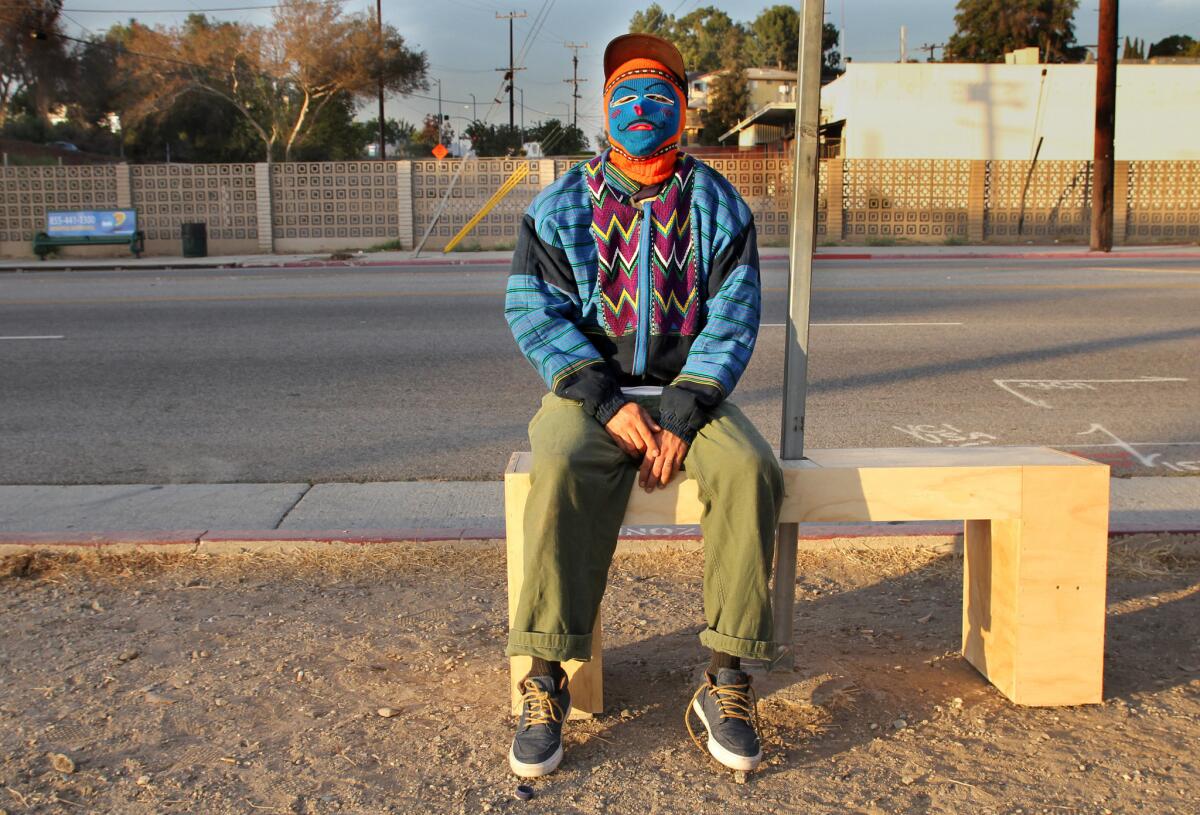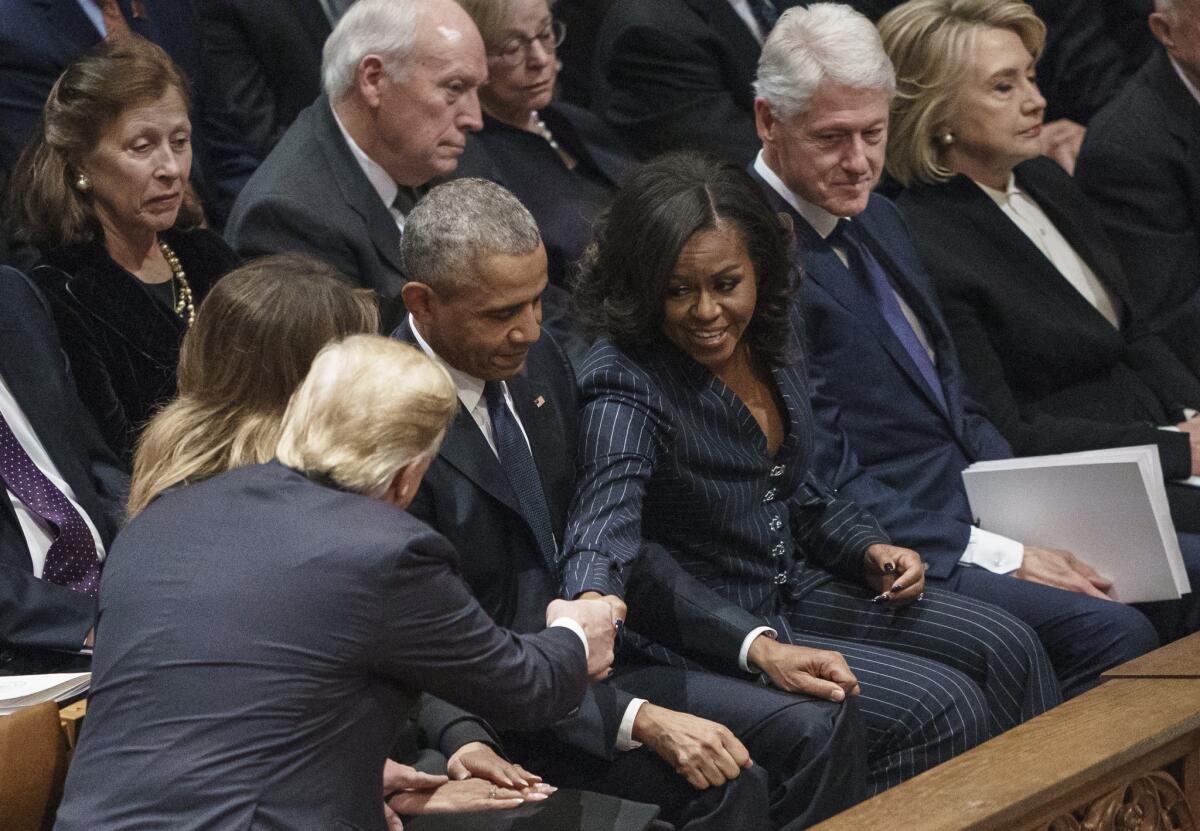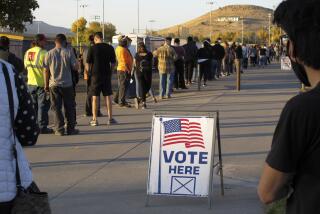Feedback: Reaction to coverage of George H.W. Bush’s funeral, Grammy picks and ‘Baby It’s Cold Outside’

Give this guy an award
I was intrigued by the article about an anonymous artist who makes chairs at a bus stop on the east side of Los Angeles [“He Wants You to Have a Seat,” Nov. 28, by Carolina Miranda]. In our current day, it’s rare to see news like this about citizens helping and contributing to the growth of their nation.
As a high school student who often takes the bus, it’s stressful for me to stand under a hot burning sun, standing and waiting for a bus that takes 30 minutes to arrive, not to mention what the elderly citizens who are ill go through. As for this artist, I think he deserves an award for a good job he is doing in his community.
Manuelda Koumba
Hawthorne
Politics and the Bush Funeral

Regarding “At Bush Funeral, Grief Tops Politics” [Dec. 6]: Television critic Lorraine Ali wrote “Then the president shook hands with the Obamas but failed to do so with Bill or Hillary Clinton or Jimmy and Rosalynn Carter. So much for healing deep divisions.”
But it wasn’t necessary for President Trump to shake hands with everyone in the row in that solemn setting. Why did you suggest it was necessary or expected?
A little later the former President George W. Bush did go down the first row, reaching over the divider and shaking hands with everyone.
Why didn’t you mention that and how gracious that was?
Doug Chapman
Santa Ana
::
The last line of your column bodes badly for all of us. In this day and age of political foment, there will be no more niceties extended to both parties.
What a shame that politics has gotten so nasty and evil.
I hope at some point we can all get back on track and be decent to one another.
Leslie Gregg
Redondo Beach
::
I have been watching for someone to give a level-headed review of the funeral. Yours is the first I have found. Very good work.
Dennis McGoldrick
Torrance
::
Though I am not a fan of President Bush, your words made him important. Keep up the good writing.
Eric Garnier
Ventura
::
Why you or your paper felt it necessary to politicize the Bush funeral demonstrates the lowest levels of journalism.
Mike Garnet
Palm Desert
::
Why did you omit the funeral of President George H.W. Bush from your TV Highlights in Wednesday’s paper? It was a beautiful tribute. How sad that some may have missed it because you chose not to list it.
Ronald Lenggiere
San Dimas
‘Schindler’s List’ 25 years later
In Akiva Gottlieb’s commentary about the movie “Schindler’s List,” [“So Much More Important Than a Movie,” Dec. 5] there was a quote from 1994 from Village Voice film critic J. Hoberman, with which I heartily disagree: “He [Steven Spielberg] made a feel-good movie about the ultimate feel-bad experience.”
What part of “Schindler’s List” was “feel good?” I think what was intended as a catchy phrase was way off base.
Linda D. Finn
Marina del Rey
::
In “Schindler’s List,” Steven Spielberg relies on the same narrative device to tell a story about the Holocaust that he used in “Jaws,” “Close Encounters,” “E.T.” and “Jurassic Park” to tell stories about sharks, extra-terrestrials and dinosaurs. The viewer encounters an extraordinary phenomenon through the eyes of a relatable person who intervenes to help. Jews are thus rendered supporting characters in their own story.
Nevertheless, the film is a transcendent masterpiece that teaches about the Holocaust and demands empathy for the endangered Jews.
Stephen A. Silver
San Francisco
How to avoid awards bias
Regarding “Is a New Tune in Store?” [Dec. 6]: When so much focus is given to achieving diversity and inclusion in the nominations and awards, it undermines the objectivity and fairness in selecting the winners. The Grammy executives might say they are not looking for quotas, but that’s exactly what they are trying to achieve.
Norman Eagle
Palos Verdes
::
How to avoid bias (from a math professor):
Biases in award selection can be avoided by selecting randomly. Select six nominees for each award, and roll a single die one time to determine the winner.
If random awards aren’t desirable, remember this: Wherever human beings choose things, there will always be bias. Choosing someone as “best” is, by definition, favoritism. Forcing people to choose women, or members of certain groups, is also bias — and overt bias is worse than unintentional bias. There were years when rock-and-roll records simply didn’t win the awards. Bias by genre.
Other than applying mathematics, there is no way to avoid bias because we are all human.
Frank Daniels
Memphis, Tenn.
Baby, it’s getting colder out there
Regarding “‘Baby,’ Just Stay Out in the Cold” [Dec. 9, by Libby Hill]: How unfortunate that we must condemn all writing with which we don’t agree. I have listened to that song for four decades and have never been offended by it.
Donald S. Richmond
Riverside
::
The trash that passes for music today is full of insults and hostility toward women, but is acceptable by the masses who know nothing about music.
Fredric Reihel
Santa Monica
::
Of course, The Times has no issue with the [sexist and violent] lyrics contained within the noise masquerading as music commonly called hip-hop and rap.
Kevin Dretzka
Los Angeles
::
While I can appreciate Libby Hill’s good intentions in supporting the ban on the classy and classic song “Baby, It’s Cold Outside,” I object to the reasoning. To “pay the price” for cultural enlightenment by removing a beloved song from the airwaves is taking the #MeToo movement to ridiculous lengths.
I have survived two rapes and one attempted rape, and consider myself a feminist. Still, there are many elements of #MeToo that I find misguided and petty.
Wendy Werris
Los Angeles
::
Yes, times have changed. Now cute lyrics that have brought joy to millions are “harmful,” and innocent fun is banned because someone misinterprets the song and is uncomfortable.
A lot of art that made people uncomfortable used to be called great. Not all “change” is for the better.
David Goodwin
Pasadena
::
“Cultural casualties” such as banishing “Baby, It’s Cold Outside” are “the price we pay for a better world”?
If more people could learn to resist the urge to condemn a classic song by distorting its original intentions and saying it fails to serve a purpose for which it was never designed, that would be a better world.
Preston Neal Jones
Hollywood
::
Can we please remove “I Saw Mommy Kissing Santa Claus” from the holiday music rotation list? The thought of a little boy on Christmas Eve witnessing his mother kissing a man other than her husband is kinda creepy.
Steve Bowerman
Westlake Village
His lyric sounds awfully familiar
Regarding “Underrated / Overrated” [Dec. 9]: I just have to believe Chris Barton was aware that the line “The best lack all conviction,” is from the poem “The Second Coming” by William Butler Yeats. The poem’s next line is: “while the worst are full of a passionate intensity.” So yes, that line has been written, and better than Andrew Bird in his song “Bloodless.”
Anne Beaty
Los Angeles
More to Read
The biggest entertainment stories
Get our big stories about Hollywood, film, television, music, arts, culture and more right in your inbox as soon as they publish.
You may occasionally receive promotional content from the Los Angeles Times.







